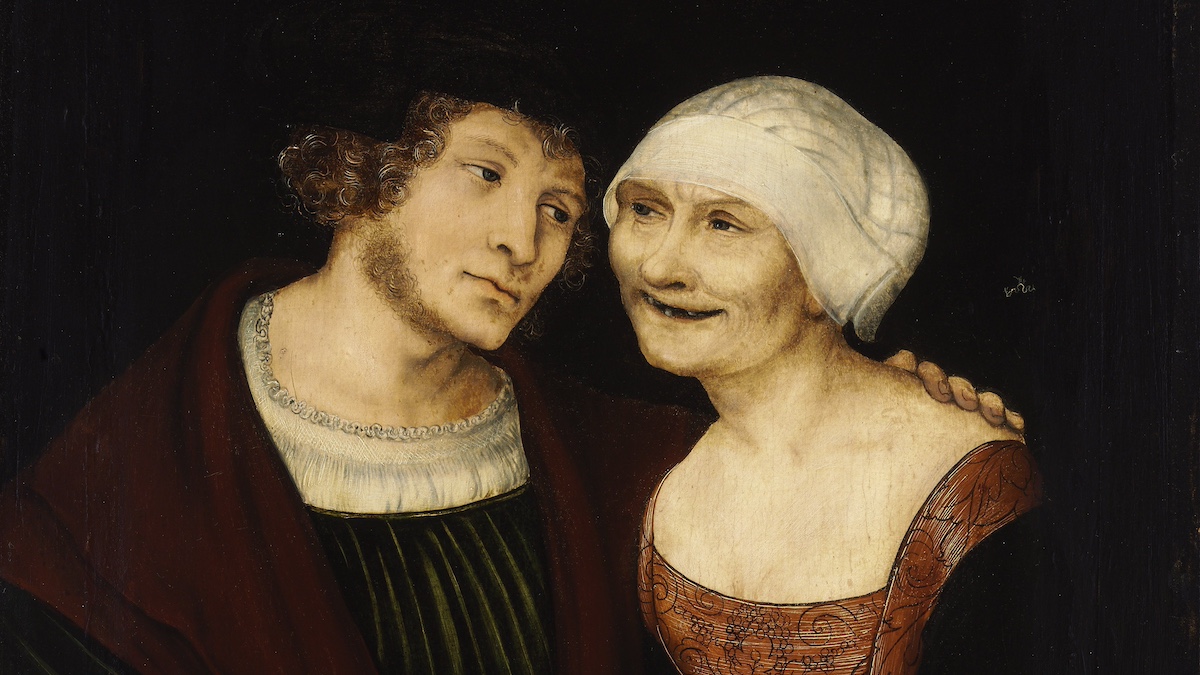2024 was the year of the “older woman/younger man” romance. Multiple Hollywood movies featuring such pairings have come out this year, including The Idea of You, A Family Affair, and Lonely Planet (and the upcoming Babygirl, premiering on Christmas Day). Author Miranda July’s new book All Fours chronicles a married woman in her forties finding herself after having an affair with a younger man. These stories followed May December, which made a splash in pre-Oscars award discussion last year. Next year, we’re getting another sequel to Bridget Jones’s Diary (Bridget Jones: Mad About the Boy), which features the titular Bridget being swept off her feet by a man much her junior.
Nicole Kidman praised having an older woman date a younger man in her movie A Family Affair in her interview for People magazine:
“We’ve had it from way back with older men and younger women, that’s just always been the norm—it’s okay, it’s completely acceptable,” says Kidman. “The problem is we’ve not had the equivalent from all different viewpoints, with women telling the stories.”
Likewise, The New York Times reported that Miranda July’s book inspired many women to rethink their own lives and marriages, including breaking off engagements or exploring open marriages with their partners.
In a sort of whisper network, women who have read “All Fours” are taking a page out of the main character’s playbook and posing these same questions to one another, opening up about their hidden fantasies and frustrations.
“I’ve been talking about it more days than not with my friends,” said Caitlin Delohery, 43, a writer and content consultant who lives in Portland, Ore. “We’ve been texting about it, and we’ve met for coffee and drinks to talk about it.”
Why are these kinds of stories catching on so much right now? And is it benign? A good thing? Or potentially problematic? Well, in many ways, it’s all three.
Why Are These Stories So Popular?
These movies and novels typically have a similar general plot. An attractive and accomplished woman in her 40s (perhaps a writer, as in A Family Affair, All Fours, or Lonely Holiday, or an art curator, as in The Idea of You) is struggling with an unhappy romantic life (a dead husband in A Family Affair; split up, in The Idea of You and Lonely Planet; no spark left in All Fours) when she meets by chance a much younger, attractive man. They hit it off immediately and begin an affair. This causes friction and chaos in their social lives (conflict with the protagonist’s daughter in A Family Affair; social media bullying in The Idea of You; problems with their respective partners in Lonely Planet and All Fours). The two must overcome their own insecurities and the interference of their social groups to fight for a future together.
It’s not hard to see why these stories are popular. Many of them are well-written and very romantic. Nicole Kidman and Zack Efron’s banter is infectious; it’s easy to root for Ann Hathaway’s character against her obnoxious ex-husband; the locations in Lonely Planet are incredible; and Miranda July is intimate and raw about the inner life of her unnamed protagonist.
These stories also reflect the greater visibility and social acceptance of older women/younger men romances. Celebrity couples like Harry Styles and Olivia Wilde, Sam Taylor-Wood and Aaron Johnson, and Cher and Alexander Edwards have helped make such pairings seem acceptable and even desirable. Today reported one survey that showed 81 percent of women were open to dating a younger man and nearly 90 percent of men were open to dating an older woman. Still, despite changing attitudes, relationships between older women and younger men are not the norm. Thus, these stories function as both feel-good underdog stories and as “comeback” or “redemption” stories. These women have had relationships and dreams that didn’t work out. Now, they’re getting a second chance at love and life. As men and women alike are single longer and longer, they want protagonists whose stories reflect their own experiences. These stories let them vicariously live out the fantasies they missed out on when they were younger: relationships with youthful members of the opposite sex.
Finally, stories about older women dating younger men are often seen as empowering tales, in which the protagonists bravely smash gender norms that are perceived as oppressive. Older woman/younger man love stories often critique society for their stigmatization of those relationships, though they make this critique in different ways. The Idea of You makes the social stigma of the protagonists’ relationship a source of conflict. When Anne Hathaway’s character’s relationship goes public, she exclaims, “I didn’t know my being happy would piss so many people off!” Her friend quips in reply, “Did I not warn you? People hate happy women.” The heroine of All Fours rages at this unfair advantage men have in sexual opportunities past a certain age. Other stories make the critique more subtly. A Family Affair and Lonely Planet don’t comment on the age gap at all, treating it as so normal that it’s not worth commenting on.
Still, many people do find such romantic pairings worthy of comment. A personal essay published at The Ethel, a website for older women run by the AARP, put it this way:
Why does it remain somewhat controversial for a woman to couple with a younger partner? Men do it with impunity. Yet some women my age (I am 59) who are dating younger men declined to be interviewed because they did not want to feel judged and believe that many people still have the archaic stereotype that the male partner should be older and wiser.
This is where this trend gets problematic.
What’s the Problem?
Too often, proponents of older women dating young men identify the inequality of age-gap relationships between men and women as a social ill that needs to be solved. In doing so, they rely upon myths that encourage other social ills.
There’s strong evidence that old-fashioned opposite-sex mate preferences are significantly innate and cross-cultural. A 2015 study across 37 countries found that they could “predict a person’s sex with 92 percent accuracy if they knew his or her preferences regarding their sexual partners.” A 2020 study across 45 countries found that both men’s preference for youth and looks and women’s preference for older mates with financial prospects were consistent across countries, even when other explanations—such as gender equality—were taken into account. Similarly, the 2012 book A Billion Wicked Thoughts looked at men and women’s porn searches and found very consistent stereotypical preferences on both sides. As the author wryly observes, after the feminist movement, romance novels stopped telling stories about poor women dating rich men and started telling stories about rich women dating… even richer men. “If the heroine is rich, then the hero is even more rich.”
Why does this matter? Because when we stigmatize the opposite sex’s mate preferences as antiquated and backward stereotypes, we encourage deep resentment toward the opposite sex when the opposite sex refuses to change. In his 2022 book Of Boys and Men, scholar Richard Reeves cites the stigmatization of innate masculine traits (including straight male sexuality) as a key driver in men’s embrace of toxic right-wing figures like Andrew Tate. What’s more, there are reasons to believe these sexual preferences are a feature, not a bug. It’s possible that they evolved in us because they help us thrive, partly by orienting us toward building families. Younger women can more easily have children, and men who create wealth are more easily able to take care of the family.
Having children and providing for them are good things. But the characteristics we associate with those abilities—such as youthful beauty, wealth, and social status—can create barriers for those who don’t live up to the ideal. That’s why the widespread preferences for these traits can make us mad. Many women feel insulted by men who feel entitled to date a woman that men find attractive without making the effort to become the kind of man that women find attractive. Yet similar dynamics are often at work in older woman/younger man romances. The heroines of these stories don’t just date younger men, they date high-status, rich, and often famous younger men. Here, while they are deconstructing male romantic norms (or at least some of them: these older women are generally still physically attractive), they are taking their own for granted.
The Happiness Within Our Reach
Strange as it may sound, these stories run the risk of harming women in a way that is similar to the way that pornography harms men. Both encourage fantasies that push men and women further apart from each other rather than closer together. As an article published by the Institute for Family Studies reported:
One consequence of watching many hours of online porn is teenage boys are beginning to treat their girlfriends like sex objects. According to one 16-year-old girl, “boys just want us to do all the stuff that they see porn stars do.”As a result, says Cindy Gallop, author Make Love Not Porn, young men don’t know the difference between making love and re-enacting porn. In an online survey conducted by the University of East London, a fifth of boys between 16 and 20 years old said they were “dependent on porn as a stimulant for real sex.”
This creates a vicious cycle. Men prefer the fantasy of porn over the reality of real women, which drives a bigger wedge between them and women, which drives them further into porn. But because porn is not what the sex drive was made for, men grow even more resentful of real-life women for not being interested in them.
There is a similar danger with these new reverse-age gap romances. Despite changing norms, because of the role both nature and nurture play, these relationships will most likely continue to be the exception rather than the rule, disproportionately distributed to the exceptionally famous and beautiful. These stories develop in women an ache for something they will likely never have, encouraging resentment toward men and society for denying it to them. Another 2024 film shows the danger clearly. The Substance centers on a celebrity named Elisabeth Sparkles (Demi Moore), who gets unceremoniously booted off her TV show because she’s aged out of it, according to the Network boss (Dennis Quaid). She decides to take a drug called “The Substance,” which creates a younger double of herself to live the life where she’s adored for her youth and beauty. In a moment of clarity, Elisabeth sees that living through her double rather than herself is sabotaging her happiness. So she decides to go on a date with a nice man who showed he was interested in her at her present age. But while she’s getting ready, she can’t make it out the door because she keeps looking out the window at a billboard of her younger counterpart. She hates herself by comparison. She ends up staying home, while her potential date texts her, confused why she doesn’t answer.
Popular movies don’t just reveal insights about our culture; they also shape our imaginations, for both good and ill. The rise in older woman-younger man romances clearly reflects changing cultural attitudes about sex. At their best, these films are feel-good love stories like any other. At worst, they can create a love for fantasy that inspires hatred or indifference toward reality. As we choose what media to consume, we should take care not to let fantasy blind us to the goodness of our real lives and the real people who inhabit them. The real tragedy is an inability to embrace the happiness that’s within our reach.



